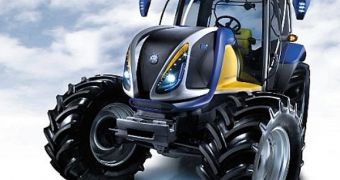The Energy Independent Farm concept developed by the New Holland Agriculture (NHA) company has yielded one of the most sophisticated pieces of farming equipment on Earth, the NH2 hydrogen-powered tractor. The impressive machine makes use of technologies similar to those already employed in the automobile industry, but takes all innovations a step further, to adapt the method to the intensive amount of force agricultural machines need to operate properly.
The tractor is but a small part of the company's overall project. To get an idea of the scale NHA is doing business on, it envisions that its new machine will be powered by hydrogen farmers produce themselves from water, with the help of electricity supplied by wind farms and solar panels. Other sources of electricity could be biomass and biogas processes that are an integrated part of the daily life of any self-respecting farm.
Inside the mechanical beast, the classic combustion engine is replaced by one capable of converting the hydrogen in fuel cells back to current, which in turn powers the electrical motors running the drivetrain and other auxiliary systems. And all of this is done almost quietly. The only noise coming from it is that made while moving over branches or other similar obstacles. The engine itself is dead quiet, as it doesn't involve the strong chemical reactions that combustion engines need to work.
The most important aspect of the NH2 tractor is that it's a completely pollution-free, carbon-neutral machine. It makes use of renewable resources, and it encourages the use of such resources in other aspects of life on a farm. It represents a totally new alternative to regular tractors, which need expensive fuel, make a lot of noise and considerably pollute the atmosphere. No nitrogen oxides, soot particles, or carbon dioxide ever comes out of a hydrogen engine.
The new prototype model has 106 horsepower, and is capable of performing all the duties of its predecessor T6000 tractor. It remains to be seen whether feasibility studies green-light the project for mass production or not. Hopefully, they will, as the NH2 is more than suited for working in tight, confined spaces, such as sheds and greenhouses.

 14 DAY TRIAL //
14 DAY TRIAL //